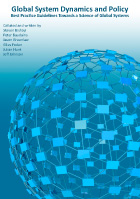Here is a review from the The Economist of 19 October 2013 of a report from the Oxford Martin Commission for Future Generations, which seems to bear on some of the thoughts aired by Carlo at the first Open GSS on the new for new forms of global governance. For example “it proposes two modest but useful reforms. The first is to make more use of “creative coalitions”…. What it means is ad hoc groups spanning governments, multilateral organisations, business, charities and NGOs which try to deal with a particular problem outside the gridlocked processes of global governance. A successful example is the coalition that is sharply reducing deaths from malaria. Its members include the United Nations, the World Health Organisation and ExxonMobil as well as the Bill & Melinda Gates Foundation and assorted governments from big rich countries and small poor ones. The commission proposes a similar effort to detect and respond to cybersecurity problems (to be called CyberEx), and another (to be called C20-C30-C40, it suggests) to combine 20 countries, 30 companies and 40 cities in search of a common agenda for tackling climate change.
Urban Science
Here are two documents I have written over the summer on beginning to define a “science of cities” or Urban Science. The first is a “ghostman” outline for a future (5-10 years) textbook on Urban Science that grew out of a workshop on cities at the Santa Fe Institute. The second is a talk on “Cities as Systems” that I gave at the request of Ralph Dum at the European Forum in Alpbach, Austria in August 2013.
ICT for Cities
Here is a chapter I wrote for a book on “Rapid Urbanization and the Future of Transforming Cities in Asia”. It is edited by Professor Genie Birch of the University of Pennsylvania. The book will be published early in 2014 so please do not distribute widely. The chapter deals mainly with the problem that municipal governments have been slow to adopt ICT as an agent of transformation. It does not deal specifically with smart cities.
Out-of-equilibrium actor-based system-dynamic modeling of the economics of climate change
A paper “Out-of-equilibrium actor-based system-dynamic modeling of the economics of climate change” by Dmitry V. Kovalevsky and Klaus Hasselmann is a contribution to GSS Preparatory Workshop for the 3rd Open Global Systems Science Conference (2014), 29-30 October 2013, Beijing, China.
The actor-based system-dynamic approach to integrated assessment modeling is illustrated for a simple model hierarchy consisting of a basic out-of-equilibrium model of economic growth and several alternative extensions demonstrating both stable and unstable dynamics. The evolution of the economy is governed by the strategies of key economic actors (aggregate producer and aggregate consumer) demonstrating that very different evolution paths can result from alternative hypotheses regarding actor behaviour. The paper serves as illustration of more realistic models designed within the MADIAMS (Multi-Actor Dynamic Integrated Assessment Model System) hierarchy to assess the long-term impacts of climate mitigation.
Research that lead to results presented in the paper has been performed in the framework of on-going EU FP7 COMPLEX project (“Knowledge based climate mitigation systems for a low carbon economy”) and projects solicited by the Russian Foundation for Basic Research.

